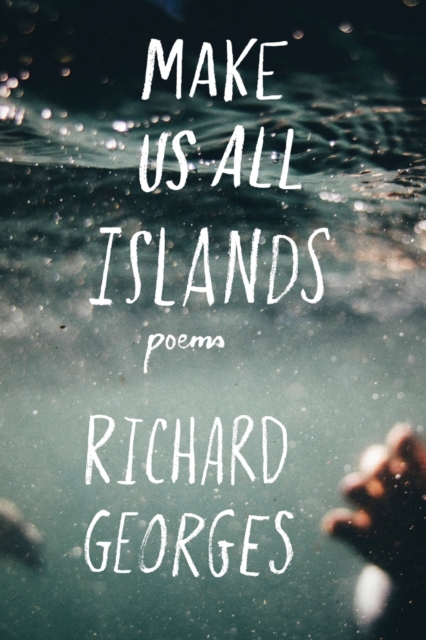
Make Us All Islands
Georges, Richard More by this author...£10.95- Poetry
- Writers of colour
Shortlisted for the Forward Prize for the Best First Collection, 2017.
"Singing ‘light into bleakness,’ in vivid poetic language that shakes us out of apathy, Georges’ harsh and lyrical hymns portray the painful beauty of the Virgin Islands and Caribbean archipelago. Searching wherever indelible traces of history may be found, in the undersea abyss of multiple shipwrecks, cholera coasts, accounts of disaster and cruel murder, hillside ruins, heaps of stones, and shifting sands, the poet brings us ancestral stories of the women of the slave ships, fishermen, migrant seasonal workers, cane cutters, cocolos, coal burners, domino players and family members who at great cost and risk have endured. If history divides us, these poems of the past and present, as strong as boiling bush and as honest as jumbie truths, have the power to revive, and, perhaps, even, connect us." —Loretta Collins Klobah
"In these pages all roads lead to the sea. The poet never plots a route. Gods fall, forgotten paths return, poetry books break and glasses of water kill. Though the sea divides, it brings redemption. Georges shows all mankind to be one author. His beauteous poems rise like coral islands. Justice is done." —Andre Bagoo
"Richard Georges’ poems enters Caribbean literature like the sea rolling up sotto voce on the sand after the last of the small fuss of waves in the shallows. The voice is placid, and leaves no print of self-conscious style and ego but rather the poems themselves, rolling softly up the beach and then sucking us into a greater history of the sea and our only and sometimes lonely selves— our i-lands. The poems are quiet and textured as the senses themselves; senses arrested by and made constantly to face the sea. That history-carrying sea which is not the cortège of teleological time, not the dreaded flotilla of another world, but a sea that carries history, now and later in an eternal present that makes them immediate, unfinished, and perhaps more so than in other historical conventions, more capable of redemption.
Miraculously, the heart of the poems are not fleeting metaphors that praise the poet’s eye, but are born out of growing and deep-down connections between the senses of the personae and the land and manscape that surround them—the wild sewing and stitching and darning of a determined apprehension of—or rather inhabiting of—sensibility. It is that meeting point of self and something larger from which inspiration springs and sparks like welding. What emerges from this is a depth of trust in the intuition, that gives us lines like these:
'Death come as clear
as a glass of water,
brimming the rim,
wetting the lips with life.' (‘Tidings’, 43)
At points, disturbing with the loneliness of the figures in the poems—who many times are named as if in a fable: the Fisherman; the old woman—at others, comforted by the sea and other natural things, Make Us All Islands is as filled with strange, peopled loneliness as it is with an ardent self-examination through not merely probing the self, but all the things around us that make us/ ourselves. Just as the sea around them is what makes islands islands." —Vladimir Lucien